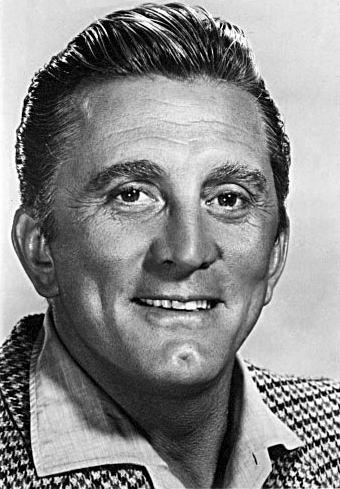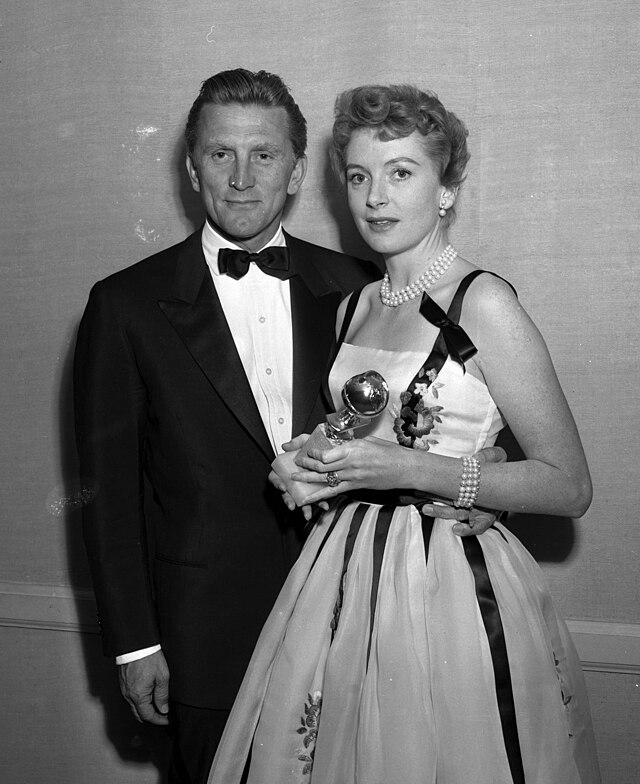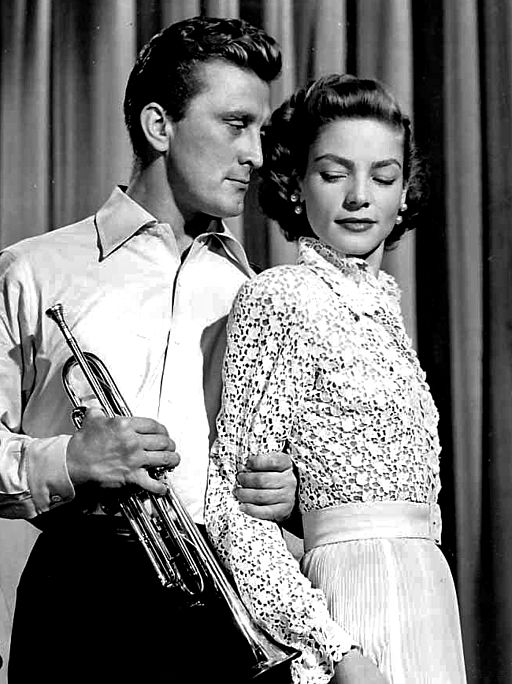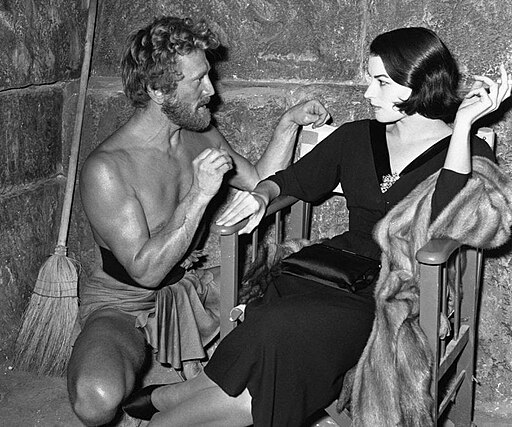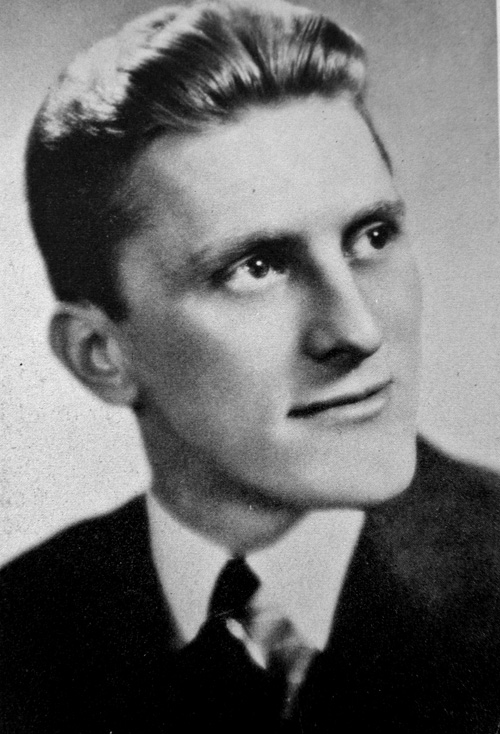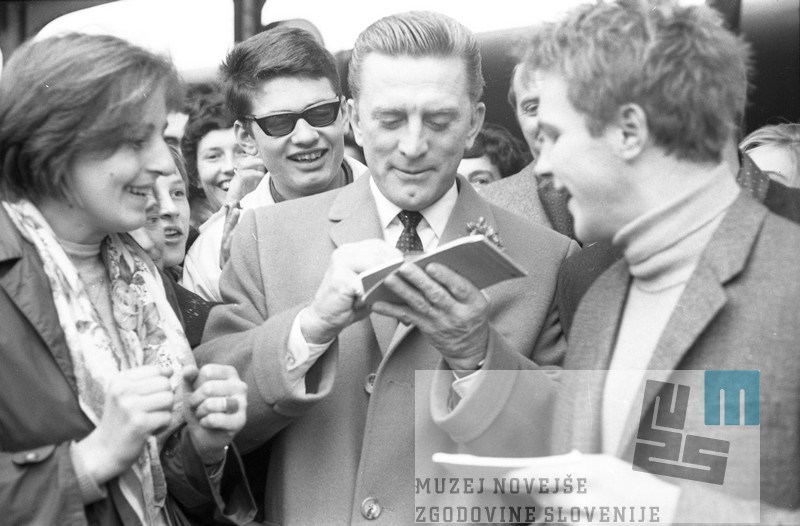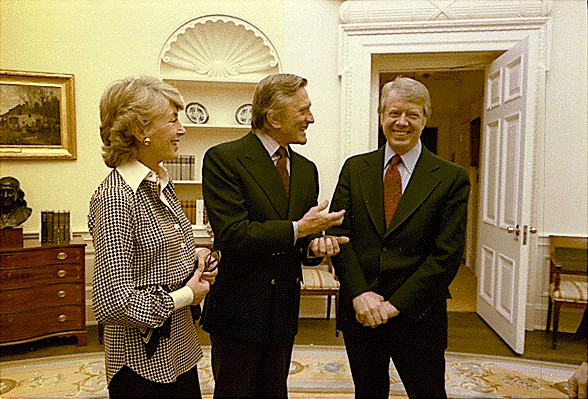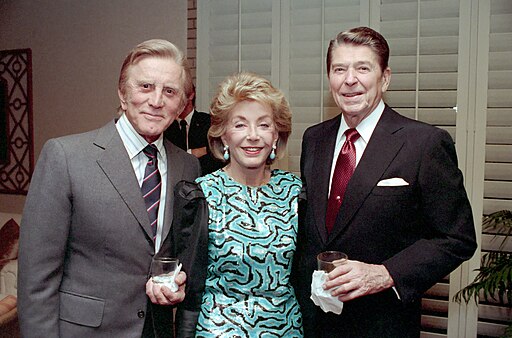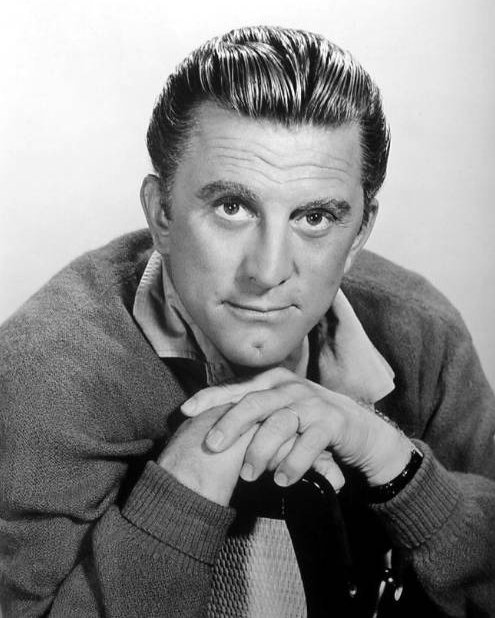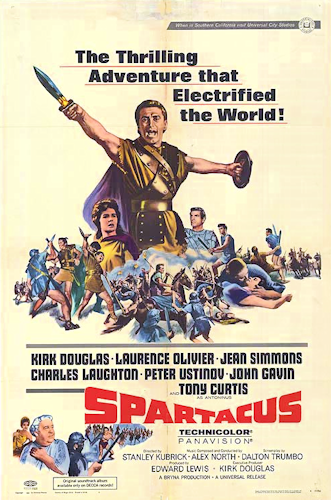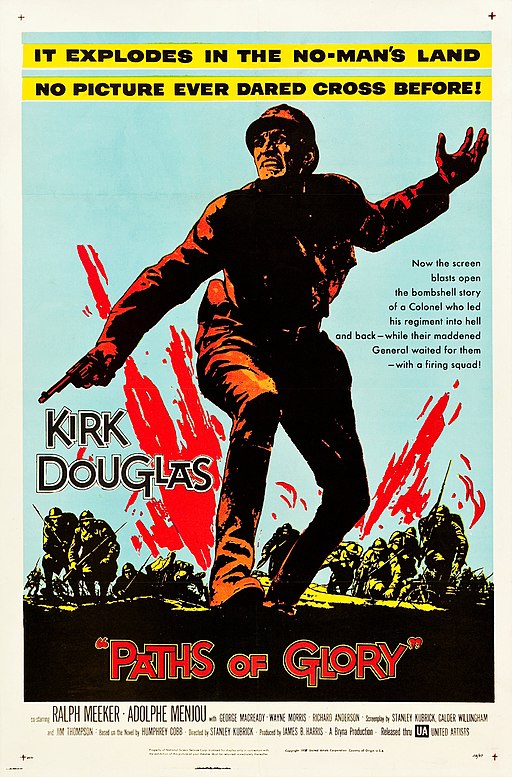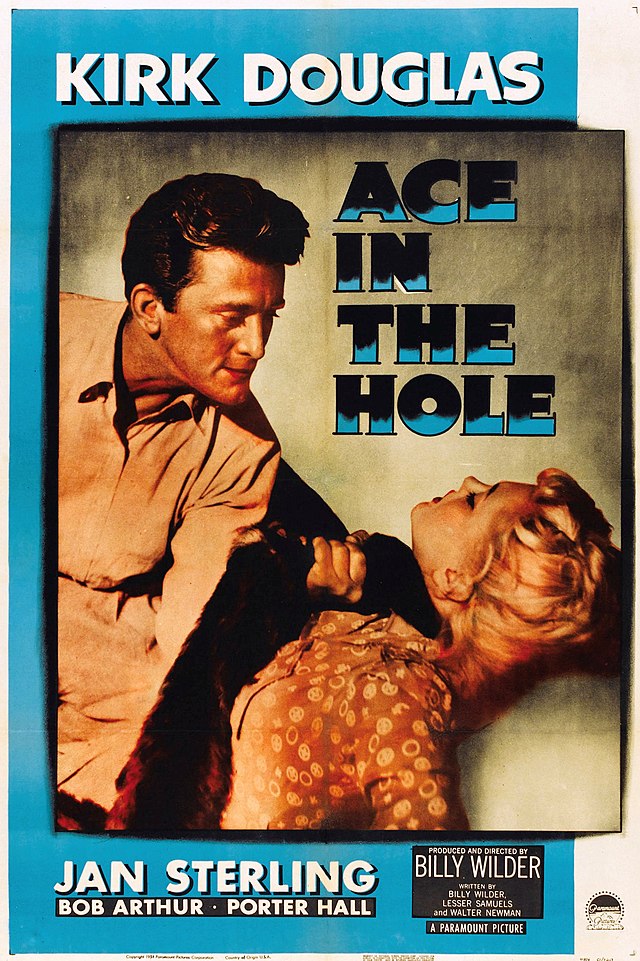Kirk Douglas
back| Full Name | Issur Danielovitch Demsky |
| Stage Name | Kirk Douglas |
| Born | December 9, 1916 |
| Birthplace | Amsterdam, New York, United States |
| Died | February 5, 2020 |
| Buried | Westwood Village Memorial Park Cemetery, Los Angeles, California, United States |
| Married to | Diana Douglas (1943 - 1951) - Anne Buydens (1954 - 2020) |
| Children | Michael Douglas (with Diana Douglas), Joel Douglas, Peter Douglas, and Eric Douglas (all with Anne Buydens). |
| Notable films | Champion (1949) - Ace in the Hole (1951) - The Bad and the Beautiful (1952) - Lust for Life (1956) - Paths of Glory (1957) - Spartacus (1960) - Seven Days in May (1964) |
Kirk Douglas
The Rugged Heir of Hollywood
Kirk Douglas was known for his intense, muscular acting style and his distinctive voice and dimpled chin. He was one of the last surviving stars of the film industry's Golden Age. Over his career, he appeared in more than 90 movies and was known for his roles in Westerns, war movies, and dramas. Douglas was also notable for his role in helping to end the Hollywood blacklist by giving screenwriter Dalton Trumbo credit in "Spartacus."
Douglas's legacy in Hollywood is marked not only by his dynamic and often intense performances but also by his impact on the industry. He was recognized with an Honorary Academy Award in 1996 for his 50 years as a creative and moral force in the motion picture community. His philanthropic efforts, particularly in the field of healthcare and education, also form a significant part of his legacy.
Kirk Douglas was often referred to as the "Rugged Heir of Hollywood," being a towering figure in the film industry, known for his intense, dynamic screen presence and his distinctive, chiseled features.
Related
Kirk Douglas
Biography and Analysis of his Movie Career
Early Years
- Birth and Family: Kirk Douglas, born as Issur Danielovitch Demsky on December 9, 1916, in Amsterdam, New York, was the son of Jewish immigrants from Belarus. His parents, Herschel Danielovitch and Bryna Sanglel, were extremely poor, and Douglas grew up with six sisters in a cramped household.
- Education and Early Struggles: Douglas showed an early interest in acting, but his impoverished background made pursuing it challenging. He worked odd jobs to fund his education, attending St. Lawrence University on a wrestling scholarship and later the American Academy of Dramatic Arts in New York City, where he began his journey into acting.
Path Towards Success
Early Stage Career: Douglas started his acting career in theater and on the radio before serving in the U.S. Navy during World War II.
Film Debut: After the war, he made his film debut in "The Strange Love of Martha Ivers" (1946). His breakthrough came with "Champion" (1949), where he played a ruthless boxer, earning his first Academy Award nomination.
Hollywood Fame: Douglas quickly became a major box-office star, known for his intense, masculine roles in dramas, war movies, and westerns. He starred in critical and commercial successes like "Young Man with a Horn" (1950), "Ace in the Hole" (1951), and "Detective Story" (1951).
Personal Life and Marriages
First Marriage: Douglas married Diana Dill in 1943, with whom he had two sons, Michael and Joel. They divorced in 1951.
Second Marriage: In 1954, he married Anne Buydens, with whom he had two more sons, Peter and Eric. Anne was a significant figure in his life, and their marriage was a long-lasting Hollywood union.
Family: His son Michael Douglas followed in his footsteps, becoming a successful actor and producer.
Passions and Philanthropy
Writing: Douglas was also an accomplished writer, publishing several books, including his autobiography, "The Ragman's Son" (1988).
Philanthropy: He was deeply involved in philanthropy, focusing on educational and healthcare projects. He and Anne founded the Douglas Foundation, which contributed to various causes.
Political Activism: Douglas was politically active, known for his liberal views and support for the Democratic Party.
Later Career and Legacy
Continued Success: Even in his later years, Douglas continued to act, appearing in films into the 2000s.
Honors: He received numerous awards, including an honorary Oscar in 1996 for 50 years of moral and creative contributions to the film industry.
Influence on Hollywood: Douglas was instrumental in breaking the Hollywood blacklist by openly crediting blacklisted writer Dalton Trumbo in "Spartacus" (1960).
Death and Cause of Death
Death: Kirk Douglas passed away on February 5, 2020, at the age of 103.
Cause of Death: The cause of his death was not publicly specified, but it was attributed to natural causes considering his advanced age.
Conclusion
Kirk Douglas's life was marked by his resilience, talent, and commitment to social causes. His journey from a struggling immigrant family to a celebrated star of Hollywood's Golden Age is a testament to his enduring impact on the film industry and American culture. His legacy continues through his films, philanthropic efforts, and the ongoing careers of his descendants in the entertainment industry.
Analysis of the Acting Style of Kirk Douglas:
Kirk Douglas's acting style was notable for its intensity, versatility, and depth, making him one of the most iconic and influential actors of Hollywood's Golden Age. Here's an analysis of various aspects of his acting style:
Intensity and Emotional Depth
Raw Intensity: Douglas was known for his raw, intense portrayals. He often played characters with a strong, forceful presence, whether as a hero or an anti-hero.
Emotional Depth: He had a unique ability to convey complex emotions, often portraying characters with inner turmoil or moral ambiguity. This depth added layers to his performances, making his characters multifaceted and relatable.
Physicality and Expressiveness
Physical Presence: Douglas's physicality was a significant part of his acting. With a background in wrestling, he brought a rugged, athletic quality to his roles, especially evident in action scenes and physically demanding roles.
Facial Expressiveness: His facial expressions were another hallmark. His intense gaze, furrowed brow, and the famous dimpled chin conveyed emotions ranging from determination and anger to vulnerability and sorrow.
Voice and Diction
Distinctive Voice: Douglas's voice was instantly recognizable. He used his crisp, authoritative voice to great effect, whether in passionate speeches, tense confrontations, or tender moments.
Articulate Diction: His clear and articulate diction, despite a mild impediment due to a scarred chin, allowed him to deliver lines with precision and impact.
Versatility and Range
Diverse Roles: Throughout his career, Douglas took on a wide range of roles, from sensitive artists (like Vincent van Gogh in "Lust for Life") to tough, morally ambiguous characters (like in "Champion" or "Ace in the Hole").
Adaptability: He adapted his style to various genres, including drama, war films, westerns, and even comedy, showcasing his versatility as an actor.
Method Acting Influences
Method Acting Techniques: While not a method actor in the strict sense, Douglas's style was influenced by the method acting trend of the time. He was known for immersing himself in his roles, bringing a sense of realism and authenticity.
Influence
Influence on Actors: Douglas's style influenced generations of actors. His ability to portray flawed, complex characters with charisma and depth helped pave the way for more nuanced, realistic acting in Hollywood.
Memorable Performances: His performances left a lasting impact on audiences and the industry, ensuring his place as a legend in the history of cinema.
Kirk Douglas's acting style was a blend of intense emotional expression, strong physical presence, and the ability to convey complex characters with depth and nuance. His legacy lies not just in the roles he played but in the way he played them, with a passion and intensity that remains influential and revered in the film industry.
Memorable Quotes from Kirk Douglas:
On Acting and Film:
- "Acting is make-believe. I never believe I'm the character, I want you to believe."
- "Virtue is not photogenic. What is it to be a nice guy? To be nothing, that's what. A big fat zero with a smile for everybody."
On Life and Success:
- "If you want to know about a man, you can find out an awful lot by looking at who he married."
- "The learning process continues until the day you die."
- "You know, you have to have some inner philosophy to deal with adversity."
On Age and Experience:
- "Age is in the mind. I know I'm old but I feel young. And I always think I can learn something new, do something new."
- "I've finally gotten old enough to appreciate the fact that I'm lucky to be old."
Reflecting on His Career:
- "I've made a career of playing sons of bitches."
- "I am Spartacus!": While not a personal quote, this iconic line from the movie "Spartacus" (1960) is one of the most famous associated with Douglas.
On Resilience and Challenges:
- "Sometimes the thing that ties you down sets you free."
- "Courage is contagious. When a brave man takes a stand, the spines of others are stiffened."
Philosophical Musings:
- "Love starts with a smile, grows with a kiss, and ends with a tear."
- "It isn’t a manly profession. Actors have to have very thick skins. You’re rejected constantly. You’re not hired because you’re too tall, too short, too fat, too thin, too old, too young, too whatever."
Kirk Douglas Trivia:
How Tall was Kirk Douglas?
Kirk Douglas was approximately 5 feet 9 inches (175 cm) tall. This height, combined with his strong physical presence and charisma, contributed to his commanding screen persona in many of his iconic film roles.
Kirk Douglas’ Military Service
Kirk Douglas served in the military. He served in the United States Navy during World War II. Enlisting shortly after the United States entered the war, Douglas served as a communications officer in anti-submarine warfare. He was medically discharged in 1944 due to injuries sustained from the accidental detonation of a depth charge.
His time in the service was a significant part of his early life, and after his discharge, he used the G.I. Bill to study at the American Academy of Dramatic Arts in New York, which played a pivotal role in launching his acting career. This background in the military added to the depth and authenticity he brought to various roles in his acting career, especially in films with military themes or characters.
The Trademark Chin of Kirk Douglas
Kirk Douglas's chin was one of his most distinctive physical features, marked by a prominent dimple. This characteristic dimple gave his chin a cleft, making it one of the most recognizable in Hollywood. Here are some key points about his iconic chin:
- Signature Feature: The cleft chin became a signature feature of Douglas's rugged good looks. It contributed to his strong, masculine on-screen persona and became a defining aspect of his physical appearance.
- On-Screen Presence: This unique feature added to his charismatic on-screen presence. In an era when movie stars' looks were often as important as their acting ability, Douglas's distinctive chin set him apart and made him instantly recognizable to audiences.
- Symbol of Masculinity: In Hollywood and popular culture, a cleft chin has often been associated with traditional ideals of masculinity and strength. Douglas's chin, combined with his intense acting style and often tough, brooding characters, reinforced this image.
- Photogenic Quality: The cleft chin was also a photogenic feature that worked well for the camera, adding character and depth to his on-screen appearance, especially in close-ups.
- Legacy: Douglas's chin became so iconic that it often came up in discussions about famous Hollywood features and even inspired comments and admiration from fans, fellow actors, and filmmakers.
- Genetic Trait: Interestingly, this trait was passed down to his son, Michael Douglas, who also became a famous actor and shares the distinctive cleft chin, further cementing it as a recognizable trait in the Douglas family legacy in cinema.
Significance of his role in “Champion” for Douglas’ Career:
Kirk Douglas's role in the 1949 film "Champion" was a pivotal point in his career, marking his emergence as a major Hollywood star and establishing his persona as a powerful, intense actor. Here's an analysis of the significance of this role for his career:
Breakthrough Performance
Critical Acclaim: Douglas's portrayal of Midge Kelly, a ruthlessly ambitious boxer, in "Champion" garnered critical acclaim. His performance was lauded for its intensity and emotional depth, showcasing his talent as a leading actor.
Oscar Nomination: He received his first Academy Award nomination for Best Actor for this role, firmly placing him in the ranks of Hollywood's elite actors.
Establishing His Screen Persona
Complex Antihero: The character of Midge Kelly was a complex antihero, a departure from the straightforward leading men of that era. Douglas's portrayal of Kelly's ambition, vulnerability, and moral ambiguity set the tone for many of his future roles.
Physicality and Intensity: "Champion" also highlighted Douglas's physicality. His background as a wrestler was advantageous in portraying a boxer, and his intense physical performance added authenticity to the role.
Impact on Subsequent Roles
Typecasting: This role led to Douglas being frequently cast in parts that required a strong, assertive presence, often with an undercurrent of inner conflict or moral complexity.
Career Longevity: The success of "Champion" paved the way for a series of powerful performances in the 1950s and beyond, contributing to his long and successful career in Hollywood.
Influence on Film and Acting
Influence on Acting Style: Douglas's performance in "Champion" was seen as a precursor to the more intense, method-driven acting styles that would become prominent in the 1950s and 1960s. His ability to convey deep emotional states influenced the next generation of actors.
Film Noir and Sports Drama: "Champion" is also significant for blending elements of film noir with the sports drama genre, setting a precedent for many future films in these genres.
Cultural Impact
Boxing Films: "Champion" is considered a classic in the boxing film genre, influencing many later films with similar themes of ambition, the price of success, and the darker aspects of the sport.
In summary, Kirk Douglas's role in "Champion" was not only a breakthrough in his career but also a defining moment that shaped his future roles and his legacy in Hollywood. It showcased his unique talents and contributed significantly to the evolution of film acting in the mid-20th century.
Awards and Nominations:
Academy Awards
Nominations:
- Best Actor: "Champion" (1949)
- Best Actor: "The Bad and the Beautiful" (1952)
- Best Actor: "Lust for Life" (1956)
Honorary Award (1996): For 50 years as a creative and moral force in the movie industry.
Golden Globe Awards
Wins:
- Best Actor in a Leading Role: "Lust for Life" (1957)
- Cecil B. DeMille Award (1968): For outstanding contributions to the world of entertainment.
- Henrietta Award for World Film Favorites: (1955, 1957)
Nominations:
- Best Actor in a Leading Role: "Champion" (1950)
- Best Actor in a Leading Role: "The Bad and the Beautiful" (1953)
- Best Actor in a Leading Role: "Spartacus" (1961)
BAFTA Awards
Nominations:
- Best Foreign Actor: "Lust for Life" (1957)
Emmy Awards
Nominations:
- Outstanding Lead Actor in a Miniseries or a Movie: "Amos" (1986)
Cannes Film Festival
Award:
- Best Actor Award: "Lust for Life" (1956)
New York Film Critics Circle Awards
Wins:
- Best Actor: "Lust for Life" (1956)
Other Honors and Recognitions
- Presidential Medal of Freedom (1981): The United States' highest civilian award.
- American Film Institute (AFI): Ranked #17 in AFI's list of the greatest male American screen legends of classic Hollywood cinema.
- Kennedy Center Honors (1994): Recognizing his lifetime contributions to American culture through the performing arts.
- Screen Actors Guild Life Achievement Award (1999): For career achievement and humanitarian accomplishment.
- National Medal of Arts (2001): Awarded by the President of the United States for his contributions to the arts.
- Hollywood Walk of Fame: Star on the Hollywood Walk of Fame for his contributions to the motion picture industry.
- Chevalier of the Legion of Honour (France): For his significant contributions to the arts.
- Numerous Film Festival Honors and Lifetime Achievement Awards: Including from the San Sebastián International Film Festival and others.
List of Movies featuring Kirk Douglas:
1940s
- 1946 - "The Strange Love of Martha Ivers": A film noir about a woman who commits a murder and the man (Douglas) who loves her.
- 1947 - "Out of the Past": A classic noir where Douglas plays a gangster entangled with a private eye and a mysterious woman.
- 1947 - "Mourning Becomes Electra": A film adaptation of Eugene O'Neill's play, Douglas plays a Civil War veteran entangled in family drama.
1950s
- 1950 - "Young Man with a Horn": Douglas stars as a talented jazz trumpeter struggling with his personal life.
- 1951 - "Along the Great Divide": A western where Douglas plays a marshal trying to bring a murder suspect to justice.
- 1951 - "Ace in the Hole": Douglas is a ruthless journalist exploiting a mining disaster for a story.
- 1951 - "Detective Story": A day in the life of a police detective (Douglas) with a personal vendetta.
- 1952 - "The Big Trees": A timber baron faces moral dilemmas over deforestation.
- 1952 - "The Big Sky": An adventurous journey of two men (including Douglas) on the Missouri River.
- 1952 - "The Bad and the Beautiful": Douglas as a manipulative Hollywood producer.
- 1953 - "The Story of Three Loves": An anthology film, with Douglas in the segment "Equilibrium."
- 1953 - "Act of Love": A romance-drama set in post-war Paris.
- 1954 - "20,000 Leagues Under the Sea": An adaptation of Jules Verne's novel, with Douglas as a harpooner.
- 1954 - "The Racers": Douglas plays a race car driver with a passion for winning.
- 1955 - "The Indian Fighter": A western about a scout (Douglas) mediating conflicts between settlers and Native Americans.
- 1955 - "Man Without a Star": A cowboy finds work on a large ranch and conflicts with the boss.
- 1956 - "Lust for Life": Douglas portrays Vincent van Gogh in this biographical film.
- 1957 - "Top Secret Affair": A romantic comedy with Douglas as a military man.
- 1957 - "Paths of Glory": A WWI drama about French soldiers unjustly accused of cowardice.
- 1957 - "Gunfight at the O.K. Corral": A western focusing on the famous shootout, with Douglas as Doc Holliday.
- 1958 - "The Vikings": A historical drama with Douglas as a Viking warrior.
- 1959 - "Last Train from Gun Hill": A marshal (Douglas) seeks justice for his wife's murder.
- 1959 - "The Devil's Disciple": Set during the American Revolution, Douglas plays an unlikely hero.
1960s
- 1960 - "Strangers When We Meet": Douglas as an architect having an affair.
- 1960 - "Spartacus": The epic tale of a slave revolt led by Spartacus (Douglas).
- 1961 - "Town Without Pity": Douglas as an attorney in a military rape trial.
- 1962 - "Lonely Are the Brave": A modern cowboy defies the modern world.
- 1962 - "Two Weeks in Another Town": A has-been actor (Douglas) tries for a comeback.
- 1963 - "The Hook": A wartime drama about the moral dilemmas of soldiers.
- 1963 - "The List of Adrian Messenger": A mystery involving a series of murders.
- 1964 - "Seven Days in May": A political thriller about a military coup in the U.S.
- 1965 - "In Harm's Way": A WWII drama with Douglas as a naval officer.
- 1966 - "Cast a Giant Shadow": The story of an American officer in the 1948 Arab-Israeli War.
- 1966 - "Paris brûle-t-il?" (Is Paris Burning?): About the liberation of Paris in WWII.
- 1967 - "The Way West": A western about settlers moving to Oregon.
- 1967 - "The War Wagon": A cowboy plans a heist against an armored wagon.
- 1968 - "A Lovely Way to Die": A detective story with Douglas as a private eye.
- 1968 - "The Brotherhood": A drama about the Mafia, with Douglas as a lawyer.
- 1968 - "Once Upon a Wheel": A documentary on professional racing, narrated by Douglas.
- 1969 - "The Arrangement": A drama about a man (Douglas) facing a midlife crisis.
- 1969 - "The Gypsy Moths": A drama centered on skydiving performers.
1970s
- 1970 - "There Was a Crooked Man...": A western comedy where Douglas plays a charming outlaw trying to retrieve hidden loot.
- 1971 - "A Gunfight": A western about two aging gunslingers (Douglas and Johnny Cash) who arrange a showdown for money.
- 1971 - "The Light at the Edge of the World": A drama about pirates taking over a lighthouse on a remote island.
- 1972 - "The Master Touch": Douglas as a master safecracker planning a heist in Germany.
- 1973 - "Scalawag": A pirate adventure film, also directed by Douglas, set in the 19th century.
- 1974 - "Ulysses": An Italian-made adventure film based on Homer's epic, with Douglas as Ulysses.
- 1975 - "Posse": Douglas plays a marshal who uses his posse to further his political ambitions.
- 1976 - "Once Is Not Enough": A drama about a young woman's turbulent Hollywood lifestyle.
- 1977 - "Holocaust 2000": A horror film where Douglas's character confronts apocalyptic visions.
- 1978 - "The Fury": A supernatural thriller about a government agency exploiting psychics.
- 1979 - "The Villain": A comedy western featuring Douglas as a bumbling outlaw.
1980s
- 1980 - "Saturn 3": A sci-fi thriller about two space station inhabitants terrorized by a madman and his robot.
- 1980 - "Home Movies": Douglas plays a film professor in this satirical comedy.
- 1982 - "The Man from Snowy River": An Australian western where Douglas plays twin brothers.
- 1983 - "Eddie Macon's Run": A drama about a man on the run to Mexico and the cop chasing him.
- 1984 - "Draw!": A comedic western TV movie with Douglas as a former gunslinger.
- 1985 - "Amos": A TV movie where Douglas plays a nursing home resident fighting against abuse.
- 1986 - "Tough Guys": A comedy about two old ex-cons (Douglas and Burt Lancaster) readjusting to modern life after prison.
1990s
- 1991 - "Oscar": A comedy where Douglas plays a notorious gangster.
- 1994 - "Greedy": A comedy about a wealthy uncle (Douglas) and his money-hungry family.
- 1999 - "Diamonds": Douglas as an ex-boxer recovering from a stroke and searching for his hidden diamonds.
2000s
- 2003 - "It Runs in the Family": A comedy-drama featuring three generations of the Douglas family, including Kirk, his son Michael, and grandson Cameron.
- 2004 - "Illusion": A film about an ailing film director who gets a chance to see an alternate version of his son's life.

